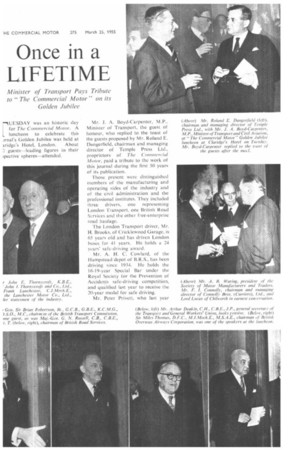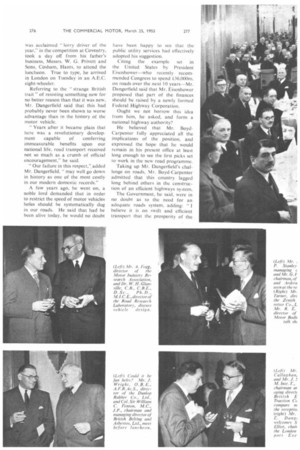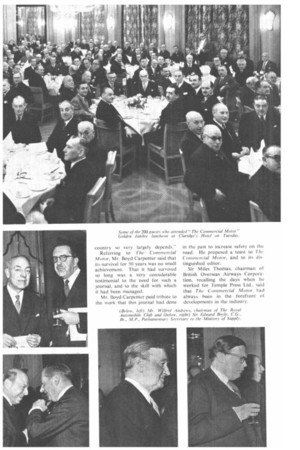Once in a LIFETIME
Page 43

Page 44

Page 45

If you've noticed an error in this article please click here to report it so we can fix it.
Minister of Transport Pays Tribute to "The Commercial Motor" on its Golden Jubilee 71JESDAY was an historic day for The Commercial Motor. A L luncheon to celebrate this Jrnal's Golden Jubilee was held at
Iridge's Hotel, London. About D guests--leading figures irp their ;pective spheres—attended.
Mr. J. A. Boyd-Carpenter, M.P. Minister of Transport, the guest of honour, who replied to the toast of the guests proposed by Mr. Roland E. Dangerfield, chairman and managing director of Temple Press Ltd.. proprietors of The Commercial Motor, paid a tribute to the work of this journal during the first 50 years of its publication.
Those present were distinguished members of the manufacturing and operating sides of the industry and of the civil administration and the professional institutes. They included three drivers, one representing London Transport, one British Road Services and the other free-enterprise road haulage.
The London Transport driver, Mr. H. Brooks. of Cricklewood Garage, is 65 years old and has driven London buses for 41 years. He holds a 24 years' safe-driving award.
Mr. A. I-1. C. Cowlard, of the Hampstead depot of B.R.S. has been driving since 1934. He holds the 16-19-year Special Bar under the Royal Society for the Prevention of Accidents safe-driving competition, and qualified last year to receive the 20-year medal for safe driving.
Mr. Peter Privett, who last year
was acclaimed " lorry driver of the year," in the competition at Coventry, took a day off from his father's business, Messrs. W. G. Privett and Sons, osham, Hams, to attend the luncheon. True to type, he arrived in London on Tuesday in an A.E.C. eight-wheeler.
Referring to the strange British trait" of resisting something new for no better reason than that it was new. Mr. Dangerfield said that this had probably never been shown to worse advantage than in the history of the motor vehicle.
" Years after it became plain that here was a revolutionary development capable of conferring immeasurable benefits upon our national life, road transport received not so much as a crumb of official encouragement." he said.
" Our failure in this respect,-added Mr. Dangerfield. "may well go down in history as one of the most costly in our modern domestic records."
A few years ago, he went on, a noble lord demanded that in order to restrict the speed of motor vehicles holes should be systematically dug in our roads. He said that had he been alive today, he would no doubt
have been happy to see that the public utility services had effectively adopted his suggestion.
Citing the example set in the United States by President Eisenhower—who recently recommended Congress to spend £36,000m. on roads over the next 10 years—Mr. Dangerfield said that Mr. Eisenhower proposed that part of the finances should be raised by a newly formed Federal Highway Corporation.
Ought we not borrow this idea from him, he asked, and form a national highway authority?
He believed that Mr. Boyd. Carpenterfully appreciated all the implications of the position, and expressed the hope that he would remain in his present office at least long enough to see the first picks set to work in the new road programme.
Taking up Mr. Dangerfield's challenge on roads, Mr. Boyd-Carpenter admitted that this country lagged long behind others in the construction of an efficient highways syitem, The Government, he said, were in no doubt as to the need for an adequate roads system. adding: " I believe it is on swift and efficient transport that the prosperity of the country so very largely depends."
Referring to The Commercial Motor, Mr. Boyd-Carpenter said that its survival for 50 years was no small achievement. That it had survived so long was a very considerable testimonial to the need for such a journal, and to the skill with which it had been managed.
Mr. Boyd-Carpenter paid tribute to the work that this journal had done
in the past to increase safety on the road. He proposed a toast to The Commercial Motor, and to its distinguished editor.
Sir Miles Thomas, chairman of British Overseas Airways Corpora• tion, recalling the days when he worked for Temple Press Ltd., said that The Commercial Motor had always been in the forefront of developments in the industry.
























































































